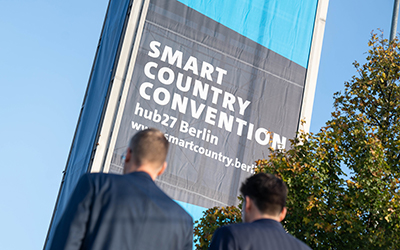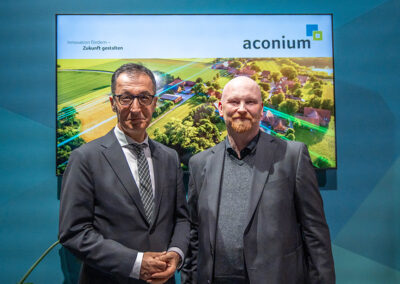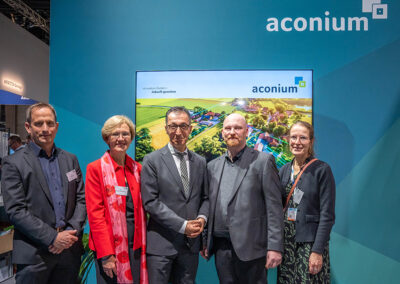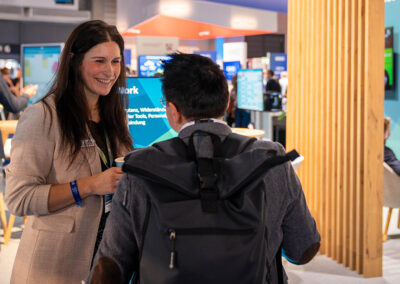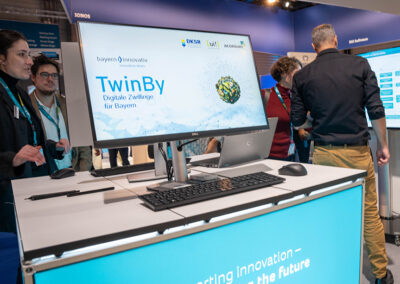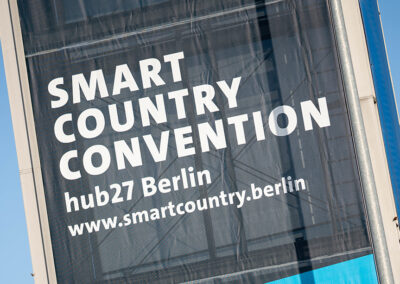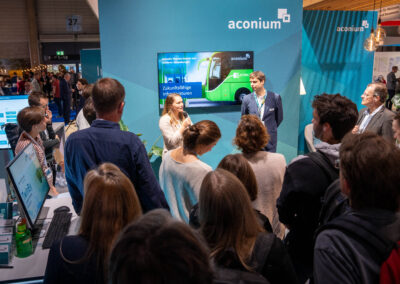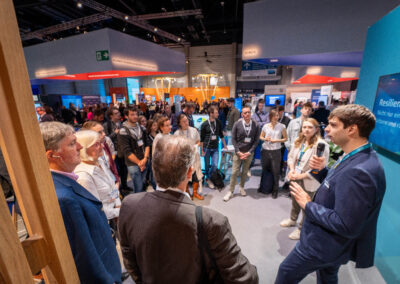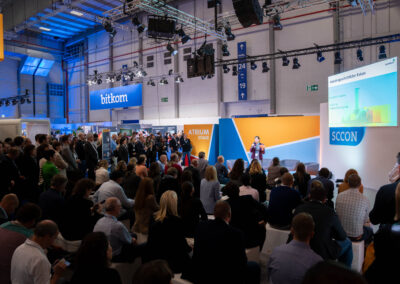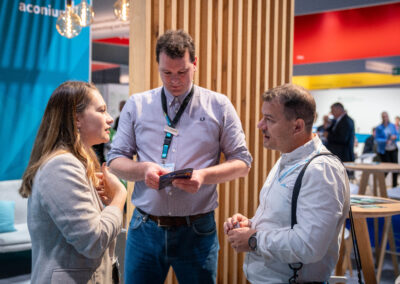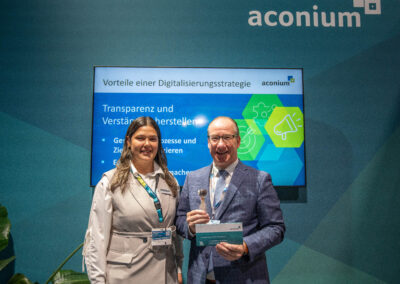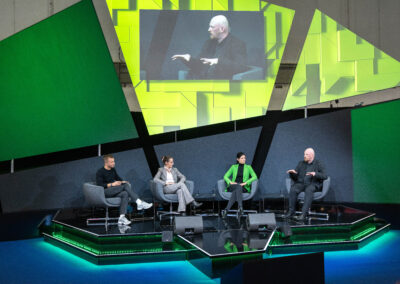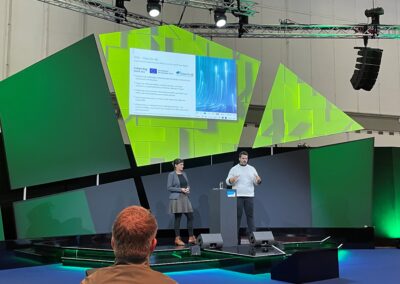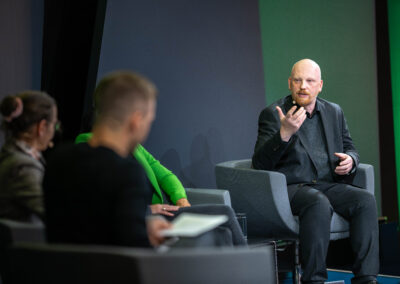15.10.2024 – Day 1
The Smart Country Convention in Berlin opened its doors again on October 15. Germany’s largest trade fair focusing on the digitalization of administration and public institutions took place in the state capital until 17 October. On the very first day, thousands of visitors came together to discover innovations, find inspiration and make contacts.
The Smart Country Convention 2024 ended on October 17 with a record turnout: More than 18,000 participants, 400 partners and 600 speakers attended this year’s leading event for the digital state and public services.
Federal Minister of the Interior Nancy Faeser officially opened the trade fair with a keynote speech, which was seamlessly followed by specialist panels, presentations and workshops on AI, open source and cloud solutions, digital services of general interest and eGovernment.
The event was a must for digital innovation drivers, which is why aconium was also represented with a stand. At stand 402 in hub27, interested parties were able to talk to our experts on the topics of smart cities & regions, urban and rural resilience and new work and find out more about our projects such as “Smart Regions Saxony“, “TwinBy – Digital Twins for Bavaria“, “Data4All” and “DoorCE“.
A special moment for our experts on site was the visit of Cem Özdemir, Federal Minister of Food and Agriculture, to our stand. One of the topics of discussion between him and our Managing Director Tim Brauckmüller was the digitalization of rural areas, which is important for the Minister’s activities and which aconium can report on thanks to its close cooperation with local authorities, including successfully implemented projects. There was a consensus that digital and sustainable infrastructures can help to make rural regions in Germany even more liveable and sustainable. He was also shown various application scenarios for digital twins that were used as part of TwinBy. These include, for example, shadow simulations that help local authorities to make optimum use of solar radiation in urban areas, photovoltaic potential registers that record the solar potential of roofs and surfaces in urban areas, and a flood hazard map that can be used to identify flood areas.
However, the Federal Minister was not our only guest. In the afternoon, the Bitkom Management Club took a tour of the site. The club is an initiative of Bitkom, which has been preparing the management elite of the ICT sector for their tasks for fourteen years. Accordingly, representatives from well-known companies such as Esri Deutschland GmbH, Deutsche Telekom Service GmbH, FC Bayern München AG, DocuWare Europe GmbH, Crayon Deutschland GmbH, BENUS IT-Service AG, Wibu Systems and secunet Security Networks AG took part in the tour. The group visited our stand to gain an insight into our areas of expertise.
The conversation with Maria Tsavachidis, CEO of EIT Urban Mobility, who discussed the company’s activities, projects and experiences with our expert Claire Piqueret Rose, Head of Smart Cities & Regions at aconium GmbH, was also informative.
In addition to their activities at the stand, our experts also contributed to the program of the Smart Country Convention. Today, Claire Piqueret Rose gave a keynote speech on the topic of “Consolidation and scaling of smart city solutions in rural areas: How can the path to a smart city succeed for non-subsidized municipalities?”. In it, she addressed aspects for the continuation of measures and structures in digitalization projects, spoke about the planned competence center and the central marketplace, which should enable the nationwide scaling of smart city solutions. She also reported on the findings of the Smart City step-by-step plan for rural municipalities, outlined visions for the future and named success factors for digitalization projects.
16.10.2024 – Day 2
The exhibition grounds – and our stand – were also bustling on the second day. Many visitors took part in a trade visitor tour, this time focusing on data economy and AI. We were able to explain the role of data and intelligent systems in the modernization of municipal infrastructures to the participants. These are drivers of the digital transformation of rural regions into smart regions.
In the morning, Martin Guth, Project Manager Smart City/Smart Regions, and Dr. Christoph Ulrich, Head of Team Data, led a workshop on the topic of “How can a digital twin strengthen the resilience of rural municipalities?” Resilience is also playing an increasingly important role for the latter. Prolonged heat, flooding and heavy rainfall are also problems that they need to adapt to. Digital twins can be valuable planning tools here. In the workshop, participants were able to address their municipal needs with regard to digital twins, learn about examples and best practices and receive information on funding and support.
In addition to the workshop, Dr Carmen Leidereiter, research associate at aconium, gave a keynote speech on the topic of “New Work: The digitalization strategy as the basis for new organizational structures – acceptance of new working models in public administration”. She explained that the transformation of the organizational structure is the central component of a smart city strategy. Using examples, she reported on the implementation of flexible working models and the opportunities associated with them.
17.10.2024 – Day 3
The third day of the Smart Country Convention came to an end and with it the entire event.
A particular highlight of the day was the panel discussion on “Impact measurement and evaluation: How effective are smart city measures?”, which was attended by Sandra Causemann, Digital Transformation Officer at the City of Gütersloh, David Gelantia, Project Manager of the Smart City Project Freiburg / DATEN:RAUM:FREIBURG, Dr. Beate Ginzel, Head of the Digital City Department, City of Leipzig, Michael Pfefferle, Head of Smart City & Mobility at Bitkom e.V. and Tanja Krins, Head of Smart City and Digital Agenda Cologne Office in the Digitization Department at the City of Cologne, our Managing Director Tim Brauckmüller also took part.
In addition, our experts Martin Guth and Dr Carmen Leidereiter gave a keynote entitled “Helping rural areas to digitize: Inspirations from implementation” . In it, they shared practical experience gained from rural digitalization projects such as Data4All. This prepares collected data from the North Sea region in a sustainable way for stakeholders and makes it accessible to them. Another example is the “Smart Regions Saxony” portal, which provides decision-makers with information on digitalization projects in Saxony as well as recommendations for action for cities, municipalities and citizens. These and other examples illustrate what rural areas need on their digitalization journey: synergy building, individual advice, inter-municipal cooperation and tailor-made solutions for different local authorities.
Participating in the event was a positive experience for us. Not only were we able to inform countless trade fair participants at our stand about the topics of resilience, new work and smart cities/regions and make new contacts, but we were also able to present our expertise to an interested audience on the big stage.

